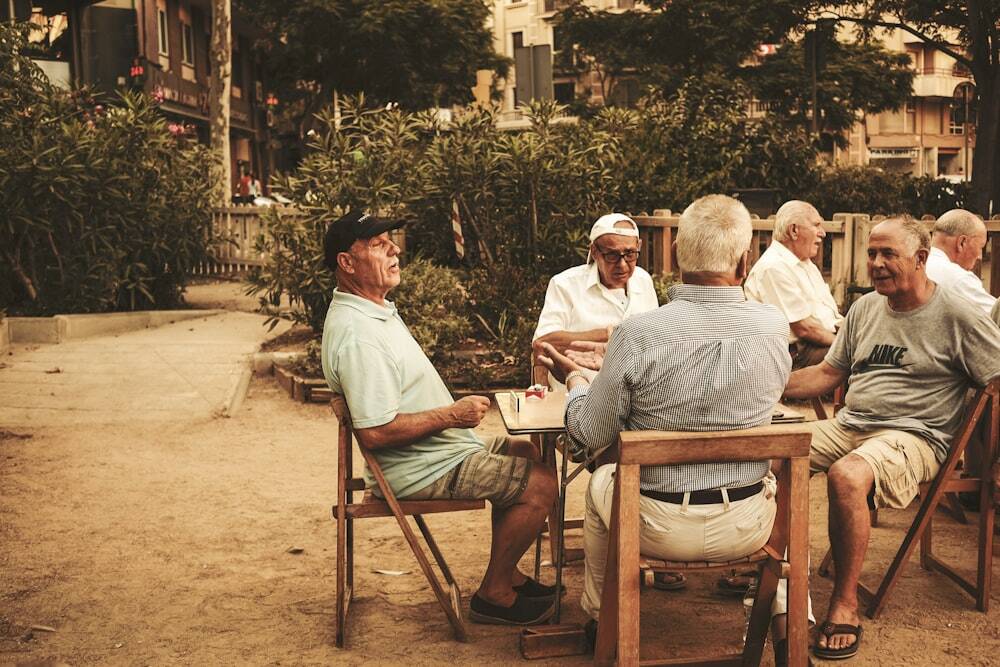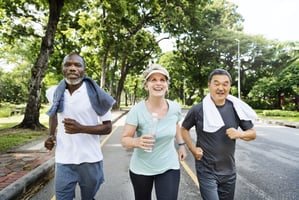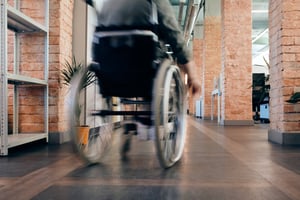10 Tips To Stay Healthy As A Senior Staying healthy as a senior is about more than just avoiding...
Things Old People Do
Things Old People Do
As we age, our bodies and minds change, and our behaviors may shift accordingly. This is true for everyone, but it’s especially noticeable in older individuals. While there is no single set of behaviors or habits that all older people engage in, there are some common trends and patterns that emerge.

Wake Up Early
Many older adults find that they naturally wake up earlier in the morning than they used to. This may be due to changes in their circadian rhythm, or simply because they don’t need as much sleep as they once did. Some older people enjoy the quiet of the early morning hours, and use this time to read, exercise, or do other activities.
Take Naps
On the other hand, many older people also find that they need more rest during the day, and may take frequent naps. This may be due to changes in their energy levels, or simply because they have more free time to relax. Napping can be a healthy way to recharge and stay alert, and studies have shown that it may even have cognitive benefits.
Engage in Physical Activity
Despite the stereotypes of older people as being sedentary, many older adults are quite active. They may go for walks, do yoga, swim, dance, or engage in other forms of exercise. Staying active is important for maintaining physical health and mobility, and can also improve mental health and cognitive function.
Spend Time With Family
As people age, their relationships with family members often become more important. Older adults may spend more time with their children, grandchildren, or other relatives, and may prioritize family gatherings and events. This can provide a sense of connection and purpose, as well as opportunities for social interaction and support.
Pursue Hobbies and Interests
Many older people have a variety of hobbies and interests that they enjoy pursuing. These might include gardening, cooking, painting, playing music, or travelling. Pursuing hobbies can provide a sense of fulfillment and enjoyment, and can also help older adults stay mentally sharp and engaged.
Reflect on Their Lives
As people age, they often become more reflective and introspective. They may think back on their lives and the experiences they’ve had, and may spend time writing or talking about their memories. This can be a way to process emotions and gain perspective, and can also provide a sense of closure and meaning.
Take Care of Their Health
Older adults are often more conscientious about their health than younger people. They may go to the doctor more frequently, take medication as prescribed, and engage in healthy behaviors such as eating a balanced diet and avoiding smoking and excessive alcohol consumption. This can help them maintain their physical and mental well-being, and may also prolong their lifespan.
Sharing Wisdom and Mentoring
Old age is often synonymous with wisdom, and older adults play a crucial role in passing on their knowledge to younger generations. They become mentors, offering guidance and support based on their life experiences. Sharing their wisdom helps bridge generational gaps and promotes intergenerational understanding and respect.
Active Social Lives
Many seniors maintain active social lives. They participate in social clubs, engage in group activities, and join organizations tailored to their interests. These connections provide a sense of belonging and contribute to their overall happiness and well-being.
Travel and Exploration
Retirement often opens up opportunities for older adults to travel and explore the world. With fewer work-related constraints, they can embark on adventures they may have longed for throughout their lives. Exploring new cultures, visiting landmarks, and immersing themselves in different environments broadens their horizons and provides a renewed sense of wonder.
Documenting Family History and Legacy
Old people do often take on the task of preserving family history. They compile photo albums, write memoirs, and share stories with younger family members. By documenting their legacy, they ensure that their experiences, values, and traditions are passed down through generations, fostering a sense of identity and connection.
Embracing a Slow-Paced Lifestyle
Older adults often appreciate and embrace a slower pace of life. They prioritize relaxation, leisure activities, and taking time for themselves. Engaging in activities like reading, crossword puzzles, knitting, or simply enjoying a quiet moment in nature allows them to savor the present and find contentment in simple pleasures.
Engaging in Intergenerational Relationships
Older adults recognize the importance of intergenerational connections and actively seek opportunities to engage with younger individuals. They may volunteer at schools, mentor younger generations, or participate in programs that facilitate intergenerational interactions. Building relationships across age groups fosters mutual understanding, learning, and the passing on of values and traditions.
Engaging in Financial Planning
Older adults are often diligent in managing their finances and planning for their future. They may consult financial advisors, review their investments, and make informed decisions regarding estate planning, wills, and retirement funds. Taking proactive steps to secure their financial well-being provides a sense of security and peace of mind.
Practicing Mindfulness and Spirituality
Many older adults turn to mindfulness practices and spirituality as a means of finding inner peace and purpose. Meditation, prayer, or engaging in religious or spiritual activities can help older individuals navigate life’s challenges, cultivate gratitude, and find solace during times of transition or loss.
Demonstrating Resilience and Adaptability
Older adults often showcase remarkable resilience in the face of adversity. They have weathered various life experiences and have developed coping mechanisms to navigate challenges. Whether it be health issues, loss of loved ones, or adapting to changing circumstances, older individuals demonstrate their ability to bounce back and find strength in their resilience.
Contributing to Society
Older adults make significant contributions to society through their expertise, skills, and wisdom. Many remain active in their communities, engaging in volunteer work, mentorship programs, or civic engagement. They play an essential role in shaping community development and offering guidance based on their years of experience.
The Importance of Socialization for the Elderly
Socialization is crucial for older adults as it helps them stay engaged, active, and connected with others. Unfortunately, many older people may experience social isolation due to a variety of factors such as health issues, mobility limitations, or the loss of loved ones.
However, there are several ways that older adults can maintain social connections:
- Joining clubs or groups: There are various community organizations geared towards seniors such as book clubs, walking groups, or hobby-oriented associations. Joining one of these groups can provide a sense of belonging and purpose while also fostering new relationships.
- Volunteering: Volunteering is an excellent way to give back to the community while also meeting new people. Older adults may choose to volunteer at local hospitals, libraries, schools, or charities that align with their interests.
- Taking classes: Many colleges and universities offer courses for seniors on topics ranging from art history to computer skills. These classes not only provide opportunities for learning but also create chances for interaction with other students.
- Engaging in online communities: While face-to-face interactions are essential, technology can help bridge the gap when physical meetings aren’t possible. Online forums or chat rooms centered around hobbies or interests can be a great way for older adults to connect with like-minded individuals.
By maintaining social connections through these activities and others like them, older adults can enjoy improved mental health and reduced risks of depression and anxiety.
Strategies for Maintaining Mental Agility for the Elderly
Our brains undergo changes that can lead to cognitive decline as we age. However, there are strategies that older adults can use to maintain mental agility and prevent or delay cognitive decline.
- Challenge your brain: Engaging in mentally stimulating activities such as reading, crossword puzzles, or learning a new skill can help keep the brain active and improve cognitive function.
- Stay socially active: Social interaction is important for mental health and may also help prevent cognitive decline. Older adults should try to stay connected with friends and family members, join clubs or community groups, or volunteer in their communities.
- Exercise regularly: Physical activity not only benefits physical health but also has been shown to improve cognitive function. Older adults should aim to engage in regular exercise such as walking, swimming, or yoga.
- Eat a healthy diet: A balanced diet that includes plenty of fruits, vegetables, whole grains, lean protein sources, and healthy fats can help support brain health and prevent cognitive decline.
- Get enough sleep: Sleep is important for overall health and plays a role in memory consolidation and other cognitive processes. Older adults should aim to get 7-8 hours of sleep per night.
By incorporating these strategies into daily life, older adults can promote mental agility and reduce their risk of cognitive decline.
How to Support Elderly People on Their Habits
- Join in: If possible, join in on the habits that the older adult is practicing. For example, if they enjoy walking, offer to go on a walk with them.
- Provide resources: Help the elderly person access resources or materials that can support their habits. This might include things like exercise equipment, healthy recipes, or educational materials.
- Keep it fun: Encourage the older adult to find joy and pleasure in their habits. This can help them stay engaged and motivated over time.
- Be patient: Habits take time to develop and maintain. Be patient and supportive as the elderly person works to establish new habits or maintain existing ones.
- Offer help: If the elderly person needs assistance with their habits, offer to help in any way you can. This might include providing transportation to a fitness class or helping with meal preparation.
Strategies for Motivating Elderly People to do What They Used to do
- Focus on the benefits: Highlight the benefits of engaging in activities or behaviors that the elderly person used to enjoy. This might include improved physical health, increased social connections, or enhanced cognitive function.
- Start small: Encourage the elderly person to start small and gradually build up their activity level or involvement in a particular behavior. This can help prevent feelings of overwhelm or discouragement.
- Provide support: Offer support and assistance as needed to help the elderly person engage in activities or behaviors they used to enjoy. This might include things like transportation, financial assistance, or emotional support.
- Make it social: Encourage the elderly person to engage in activities or behaviors with others. This can help them stay motivated and provide a sense of connection and community.
- Be flexible: Recognize that the elderly person’s abilities and interests may have changed over time. Be open to exploring new activities or approaches that are better suited to their current needs and preferences.
- Celebrate successes: Acknowledge and celebrate progress and successes along the way. This can help the elderly person feel motivated and proud of their accomplishments.
Ways to Help Old People Love the Things They Do:
- Encourage exploration: Encourage the elderly person to explore new activities or hobbies that they may enjoy. This can help them discover new passions and interests.
- Make it meaningful: Help the elderly person connect their activities or hobbies to something meaningful or purposeful. For example, if they enjoy knitting, they might consider knitting hats for premature babies or blankets for shelter animals.
- Focus on strengths: Help the elderly person identify their strengths and interests, and find activities or hobbies that align with these strengths. This can help them feel more confident and engaged in what they’re doing.
- Provide support: Offer support and assistance as needed to help the elderly person engage in activities or hobbies they enjoy. This might include things like transportation, financial assistance, or emotional support.
- Make it social: Encourage the elderly person to engage in activities or hobbies with others. This can help them stay motivated and provide a sense of connection and community.
- Keep it fun: Encourage the elderly person to find joy and pleasure in what they’re doing. This can help them stay engaged and motivated over time.
- Be patient: Remember that it may take time for the elderly person to find activities or hobbies that they truly love. Be patient and supportive as they explore their options.
Summary
In conclusion, there is no one-size-fits-all set of behaviors that all older people engage in. However, there are some common trends and patterns that emerge as people age. By understanding these behaviors and what might be behind them, we can gain a greater appreciation for the experiences and perspectives of older adults.


